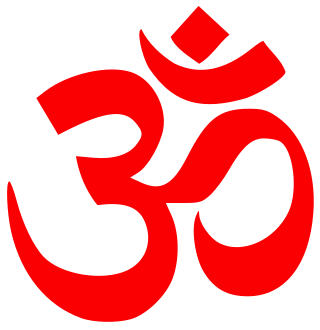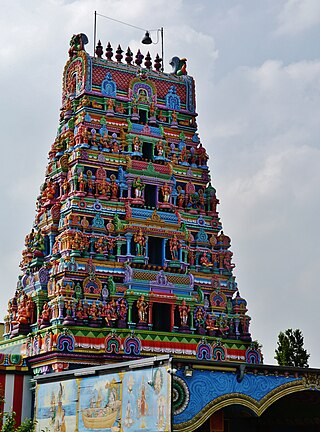
The International Society for Krishna Consciousness (ISKCON), known colloquially as the Hare Krishna movement, is a Gaudiya Vaishnava Hindu religious organization. It was founded on 13 July 1966 in New York City by A. C. Bhaktivedanta Swami Prabhupada. Its main headquarter is located in Mayapur, West Bengal, India. It claims around 1 million members worldwide, mostly in India.

Puja is a worship ritual performed by Hindus to offer devotional homage and prayer to one or more deities, to host and honour a guest, or to spiritually celebrate an event. It may honour or celebrate the presence of special guests, or their memories after they die. The word puja is roughly translated into English as 'reverence, honour, homage, adoration, or worship'. Puja, the loving offering of light, flowers, and water or food to the divine, is the essential ritual of Hinduism. For the worshipper, the divine is visible in the image, and the divinity sees the worshipper. The interaction between human and deity, between human and guru, is called a Darshanam.

Balinese Hinduism, also known in Indonesia as Agama Hindu Dharma, Agama Tirtha, Agama Air Suci or Agama Hindu Bali, is the form of Hinduism practised by the majority of the population of Bali. This is particularly associated with the Balinese people residing on the island, and represents a distinct form of Hindu worship incorporating local animism, ancestor worship or Pitru Paksha, and reverence for Buddhist saints or Bodhisattava.

Hinduism is the third largest religion in Australia consisting of more than 684,002 followers, making up 2.7% of the population as of the 2021 census. Hinduism is the fastest growing religion in Australia mostly through immigration. Hinduism is also one of the most youthful religions in Australia, with 34% and 66% of Hindus being under the age of 14 and 34 respectively.

Hinduism is the third-largest religion in Indonesia, based on civil registration data in 2023 from Ministry of Home Affairs, is practised by about 1.68% of the total population, and almost 87% of the population in Bali. Hinduism was the dominant religion in the country before the arrival of Islam and is one of the six official religions of Indonesia today. Hinduism came to Indonesia in the 1st-century through Indian traders, sailors, scholars and priests. A syncretic fusion of pre-existing Javanese folk religion, culture and Hindu ideas, that from the 6th-century also synthesized Buddhist ideas as well, evolved as the Indonesian version of Hinduism. These ideas continued to develop during the Srivijaya and Majapahit empires. About 1400 CE, these kingdoms were introduced to Islam from coast-based Muslim traders, and thereafter Hinduism, which was previously the dominant religion in the region, mostly vanished from many of the islands of Indonesia.

Hinduism is a minority religion constituting about 0.15% of the population of Austria. Hinduism is not one of the 16 recognised religions in Austria. The Austrian law allows religious groups not recognized as societies to seek official status as confessional communities with the Office for Religious Affairs. Hinduism is one of the eight confessional communities in Austria. However, the Sahaja Yoga and the International Society for Krishna Consciousness are categorised as associations, not as confessional communities.

Hinduism is a minority faith in Kenya, constituting 0.13% of the population of Kenya. Due to the efforts of the Hindu Council of Kenya, Kenya is one of only three African countries to recognise Hinduism as a religion. Hindus are free to practise their religion in Kenya, and several Kenyan cities have Hindu temples. The Hindu temples in Kenya are mostly of north and west Indian architectural style.

Hinduism is the fourth-largest religion in Germany. It is practised by around 0.1% of the population of Germany. As of 2017, there were approximately 130,000 Hindus living in the country.

Hinduism is a minority religion practised by 0.3% of the population of Botswana. The practice of Hinduism in Botswana is concentrated in and around Gaborone and Selebi-Phikwe. The community of Hindus began to form in the early 20th century with the beginning of immigration from India to Botswana. Most Hindus in Botswana are of Indian descent.

The earliest evidence of Hinduism in Tanzania is from the 1st millennium AD when there was trade between East Africa and Indian subcontinent. Most of these traders came from Gujarat, Deccan and the Chola empire. Archaeological evidence of small Hindu settlements have been found in Zanzibar and parts of Swahili coast, Zimbabwe and Madagascar.

Hinduism was first introduced by Sindhi settlers who migrated to Ghana after India was divided in 1947. It was spread to Ghana actively by Ghana's Hindu Monastery headed by Swami Ghananand Saraswati and by the International Society for Krishna Consciousness (ISKCON). Hinduism is one of the fastest growing religions in Ghana.

Hinduism is a minority religion in Hungary. According to the 2022 census, there were 3,307 Hindus in Hungary.

Hinduism in Mexico is a minority religion. There were about 12,601 (0.01%) Hindus in Mexico as of 2020.

Hinduism is one of the fastest growing religions in Northern Ireland with over 4,000 Hindus in the country, making up 0.22% of the population. There are currently 3 Mandirs in Belfast alone: Radha-Krishna Temple in Malone Road, Laxmi-Narayan Mandir in Clifton Street and Radha Madhava Mandir (ISKCON) in Upper Dunmurry Lane. There is also a Hare Krishna Centre on Inish Rath Island that was established in 1985.

Pairi Daiza is a privately owned zoo and botanical garden located in Brugelette, Hainaut, Belgium. The 65-hectare (160-acre) large animal theme park is located on the site of the former Cistercian Cambron Abbey, and is home to over 7,000 animals. The name is taken from the Avestan word pairi daēza, which is the source of the Persian word paradise.

Belgium and Indonesia established relations in 1949. Belgium has an embassy in Jakarta and an honorary consulate in Surabaya, and Indonesia has an embassy in Brussels, also accredited to Luxembourg and the European Union.
The Trisandya is a commonly-used prayer in Indian Hinduism and Balinese Hinduism. It is uttered three times each day: 6 am at morning, noon, and 6 pm at evening, in line with the Sandhyavandanam tradition.

















